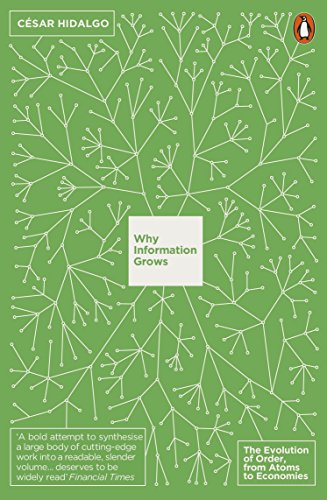why information grows evolution von hidalgo cesar (35 Ergebnisse)
FeedbackSuchfilter
Produktart
- Alle Product Types
- Bücher (35)
- Magazine & Zeitschriften (Keine weiteren Ergebnisse entsprechen dieser Verfeinerung)
- Comics (Keine weiteren Ergebnisse entsprechen dieser Verfeinerung)
- Noten (Keine weiteren Ergebnisse entsprechen dieser Verfeinerung)
- Kunst, Grafik & Poster (Keine weiteren Ergebnisse entsprechen dieser Verfeinerung)
- Fotografien (Keine weiteren Ergebnisse entsprechen dieser Verfeinerung)
- Karten (Keine weiteren Ergebnisse entsprechen dieser Verfeinerung)
- Manuskripte & Papierantiquitäten (Keine weiteren Ergebnisse entsprechen dieser Verfeinerung)
Zustand Mehr dazu
- Neu (12)
- Wie Neu, Sehr Gut oder Gut Bis Sehr Gut (6)
- Gut oder Befriedigend (16)
- Ausreichend oder Schlecht (Keine weiteren Ergebnisse entsprechen dieser Verfeinerung)
- Wie beschrieben (1)
Weitere Eigenschaften
- Erstausgabe (1)
- Signiert (Keine weiteren Ergebnisse entsprechen dieser Verfeinerung)
- Schutzumschlag (3)
- Angebotsfoto (6)
Sprache (3)
Gratisversand
Land des Verkäufers
Verkäuferbewertung
-
Why Information Grows: The Evolution of Order, from Atoms to Economies
Anbieter: medimops, Berlin, Deutschland
EUR 8,04
Währung umrechnenKostenlos für den Versand innerhalb von/der DeutschlandAnzahl: 1 verfügbar
In den WarenkorbZustand: very good. Gut/Very good: Buch bzw. Schutzumschlag mit wenigen Gebrauchsspuren an Einband, Schutzumschlag oder Seiten. / Describes a book or dust jacket that does show some signs of wear on either the binding, dust jacket or pages.
-
Why Information Grows: The Evolution of Order, from Atoms to Economies
Anbieter: Bahamut Media, Reading, Vereinigtes Königreich
EUR 5,52
Währung umrechnenEUR 3,43 für den Versand von Vereinigtes Königreich nach DeutschlandAnzahl: 1 verfügbar
In den WarenkorbPaperback. Zustand: Very Good. Shipped within 24 hours from our UK warehouse. Clean, undamaged book with no damage to pages and minimal wear to the cover. Spine still tight, in very good condition. Remember if you are not happy, you are covered by our 100% money back guarantee.
-
Why Information Grows: The Evolution of Order, from Atoms to Economies
Anbieter: ThriftBooks-Dallas, Dallas, TX, USA
EUR 5,65
Währung umrechnenEUR 3,84 für den Versand von USA nach DeutschlandAnzahl: 1 verfügbar
In den WarenkorbPaperback. Zustand: Very Good. No Jacket. May have limited writing in cover pages. Pages are unmarked. ~ ThriftBooks: Read More, Spend Less 0.6.
-
Why Information Grows: The Evolution of Order, from Atoms to Economies
Anbieter: ThriftBooks-Dallas, Dallas, TX, USA
EUR 5,65
Währung umrechnenEUR 3,84 für den Versand von USA nach DeutschlandAnzahl: 1 verfügbar
In den WarenkorbPaperback. Zustand: Good. No Jacket. Pages can have notes/highlighting. Spine may show signs of wear. ~ ThriftBooks: Read More, Spend Less 0.6.
-
Why Information Grows: The Evolution of Order, from Atoms to Economies
Anbieter: ThriftBooks-Atlanta, AUSTELL, GA, USA
EUR 5,65
Währung umrechnenEUR 3,84 für den Versand von USA nach DeutschlandAnzahl: 1 verfügbar
In den WarenkorbPaperback. Zustand: Good. No Jacket. Pages can have notes/highlighting. Spine may show signs of wear. ~ ThriftBooks: Read More, Spend Less 0.6.
-
Why Information Grows: The Evolution of Order, from Atoms to Economies.
Anbieter: Antiquariat Bookfarm, Löbnitz, Deutschland
EUR 9,07
Währung umrechnenEUR 3,00 für den Versand innerhalb von/der DeutschlandAnzahl: 1 verfügbar
In den Warenkorb256 p. Book shows only minimal traces of use and shelf wear. Very good condition. 9780241003558 Sprache: Deutsch Gewicht in Gramm: 550.
-
Why Information Grows : The Evolution of Order, from Atoms to Economies
Anbieter: Better World Books: West, Reno, NV, USA
EUR 7,42
Währung umrechnenEUR 6,21 für den Versand von USA nach DeutschlandAnzahl: 1 verfügbar
In den WarenkorbZustand: Very Good. Used book that is in excellent condition. May show signs of wear or have minor defects.
-
Why Information Grows: The Evolution of Order, from Atoms to Economies
Anbieter: ThriftBooks-Dallas, Dallas, TX, USA
EUR 6,93
Währung umrechnenEUR 6,78 für den Versand von USA nach DeutschlandAnzahl: 1 verfügbar
In den WarenkorbHardcover. Zustand: Very Good. No Jacket. Missing dust jacket; May have limited writing in cover pages. Pages are unmarked. ~ ThriftBooks: Read More, Spend Less 1.06.
-
Why Information Grows: The Evolution of Order, from Atoms to Economies
Anbieter: ThriftBooks-Reno, Reno, NV, USA
EUR 6,93
Währung umrechnenEUR 6,78 für den Versand von USA nach DeutschlandAnzahl: 1 verfügbar
In den WarenkorbHardcover. Zustand: As New. No Jacket. Pages are clean and are not marred by notes or folds of any kind. ~ ThriftBooks: Read More, Spend Less 1.06.
-
Why Information Grows: The Evolution of Order, from Atoms to Economies
Anbieter: ThriftBooks-Dallas, Dallas, TX, USA
EUR 6,93
Währung umrechnenEUR 6,78 für den Versand von USA nach DeutschlandAnzahl: 1 verfügbar
In den WarenkorbHardcover. Zustand: Very Good. No Jacket. May have limited writing in cover pages. Pages are unmarked. ~ ThriftBooks: Read More, Spend Less 1.06.
-
Why Information Grows: The Evolution of Order, from Atoms to Economies
Anbieter: ThriftBooks-Dallas, Dallas, TX, USA
EUR 6,93
Währung umrechnenEUR 6,78 für den Versand von USA nach DeutschlandAnzahl: 1 verfügbar
In den WarenkorbHardcover. Zustand: Very Good. No Jacket. Former library book; May have limited writing in cover pages. Pages are unmarked. ~ ThriftBooks: Read More, Spend Less 1.06.
-
Why Information Grows: The Evolution of Order, from Atoms to Economies
Anbieter: ThriftBooks-Atlanta, AUSTELL, GA, USA
EUR 6,98
Währung umrechnenEUR 6,78 für den Versand von USA nach DeutschlandAnzahl: 1 verfügbar
In den WarenkorbHardcover. Zustand: As New. No Jacket. Pages are clean and are not marred by notes or folds of any kind. ~ ThriftBooks: Read More, Spend Less 1.06.
-
Why Information Grows: The Evolution of Order, from Atoms to Economies
Anbieter: ThriftBooks-Atlanta, AUSTELL, GA, USA
EUR 6,98
Währung umrechnenEUR 6,78 für den Versand von USA nach DeutschlandAnzahl: 1 verfügbar
In den WarenkorbHardcover. Zustand: Very Good. No Jacket. May have limited writing in cover pages. Pages are unmarked. ~ ThriftBooks: Read More, Spend Less 1.06.
-
Why Information Grows: The Evolution of Order, from Atoms to Economies
Anbieter: ThriftBooks-Atlanta, AUSTELL, GA, USA
EUR 6,98
Währung umrechnenEUR 6,78 für den Versand von USA nach DeutschlandAnzahl: 1 verfügbar
In den WarenkorbHardcover. Zustand: Very Good. No Jacket. Former library book; May have limited writing in cover pages. Pages are unmarked. ~ ThriftBooks: Read More, Spend Less 1.06.
-
Why Information Grows: The Evolution of Order, from Atoms to Economies
Anbieter: AproposBooks&Comics, London, Vereinigtes Königreich
EUR 4,66
Währung umrechnenEUR 9,11 für den Versand von Vereinigtes Königreich nach DeutschlandAnzahl: 1 verfügbar
In den WarenkorbSoft cover. Zustand: Near Fine.
-
Why Information Grows : The Evolution of Order, from Atoms to Economies
Anbieter: Better World Books, Mishawaka, IN, USA
EUR 6,19
Währung umrechnenEUR 7,78 für den Versand von USA nach DeutschlandAnzahl: 1 verfügbar
In den WarenkorbZustand: Very Good. Used book that is in excellent condition. May show signs of wear or have minor defects.
-
Why Information Grows : The Evolution of Order, from Atoms to Economies
Anbieter: Better World Books, Mishawaka, IN, USA
EUR 6,19
Währung umrechnenEUR 7,78 für den Versand von USA nach DeutschlandAnzahl: 4 verfügbar
In den WarenkorbZustand: Good. Former library book; may include library markings. Used book that is in clean, average condition without any missing pages.
-
Why Information Grows : The Evolution of Order, from Atoms to Economies
Anbieter: Better World Books Ltd, Dunfermline, Vereinigtes Königreich
EUR 9,06
Währung umrechnenEUR 5,73 für den Versand von Vereinigtes Königreich nach DeutschlandAnzahl: 2 verfügbar
In den WarenkorbZustand: Very Good. Ships from the UK. Former library book; may include library markings. Used book that is in excellent condition. May show signs of wear or have minor defects.
-
Why Information Grows: The Evolution of Order, from Atoms to Economies
Anbieter: medimops, Berlin, Deutschland
EUR 16,49
Währung umrechnenKostenlos für den Versand innerhalb von/der DeutschlandAnzahl: 2 verfügbar
In den WarenkorbZustand: very good. Gut/Very good: Buch bzw. Schutzumschlag mit wenigen Gebrauchsspuren an Einband, Schutzumschlag oder Seiten. / Describes a book or dust jacket that does show some signs of wear on either the binding, dust jacket or pages.
-
Why Information Grows: The Evolution of Order, from Atoms to Economies
Anbieter: Ria Christie Collections, Uxbridge, Vereinigtes Königreich
EUR 12,31
Währung umrechnenEUR 5,70 für den Versand von Vereinigtes Königreich nach DeutschlandAnzahl: 16 verfügbar
In den WarenkorbZustand: New. In.
-
Why Information Grows: The Evolution of Order, from Atoms to Economies
Anbieter: Kennys Bookstore, Olney, MD, USA
EUR 16,28
Währung umrechnenEUR 1,87 für den Versand von USA nach DeutschlandAnzahl: 12 verfügbar
In den WarenkorbZustand: New. Num Pages: 256 pages. BIC Classification: KCY. Category: (P) Professional & Vocational; (U) Tertiary Education (US: College). Dimension: 198 x 129. . . 2016. Paperback. . . . . Books ship from the US and Ireland.
-
Why Information Grows: The Evolution of Order, from Atoms to Economies
Anbieter: SGOIS, Bungay, SUFFO, Vereinigtes Königreich
EUR 5,90
Währung umrechnenEUR 12,03 für den Versand von Vereinigtes Königreich nach DeutschlandAnzahl: 1 verfügbar
In den WarenkorbSoft cover. Zustand: As New. No Jacket. Printers ink stamp inside the rear cover, otherwise looks unread.
-
Why Information Grows: The Evolution of Order, from Atoms to Economies
Anbieter: moluna, Greven, Deutschland
EUR 20,16
Währung umrechnenKostenlos für den Versand innerhalb von/der DeutschlandAnzahl: Mehr als 20 verfügbar
In den WarenkorbZustand: New.
-
Why Information Grows: The Evolution of Order, from Atoms to Economies
Anbieter: Majestic Books, Hounslow, Vereinigtes Königreich
EUR 10,55
Währung umrechnenEUR 10,14 für den Versand von Vereinigtes Königreich nach DeutschlandAnzahl: 1 verfügbar
In den WarenkorbZustand: New. pp. 256.
-
Why Information Grows: The Evolution of Order, from Atoms to Economies
Anbieter: Revaluation Books, Exeter, Vereinigtes Königreich
EUR 11,96
Währung umrechnenEUR 11,46 für den Versand von Vereinigtes Königreich nach DeutschlandAnzahl: 2 verfügbar
In den WarenkorbPaperback. Zustand: Brand New. 256 pages. 7.80x5.04x0.71 inches. In Stock.
-
Why Information Grows : The Evolution of Order, from Atoms to Economies
Anbieter: AHA-BUCH GmbH, Einbeck, Deutschland
EUR 23,69
Währung umrechnenKostenlos für den Versand innerhalb von/der DeutschlandAnzahl: 2 verfügbar
In den WarenkorbTaschenbuch. Zustand: Neu. Neuware - 'Hidalgo has made a bold attempt to synthesize a large body of cutting-edge work into a readable, slender volume. This is the future of growth theory.' -- Financial Times What is economic growth And why, historically, has it occurred in only a few places Previous efforts to answer these questions have focused on institutions, geography, finances, and psychology. But according to MIT's antidisciplinarian CÃ(c)r Hidalgo, understanding the nature of economic growth demands transcending the social sciences and including the natural sciences of information, networks, and complexity. To understand the growth of economies, Hidalgo argues, we first need to understand the growth of order. At first glance, the universe seems hostile to order. Thermodynamics dictates that over time, order-or information-disappears. Whispers vanish in the wind just like the beauty of swirling cigarette smoke collapses into disorderly clouds. But thermodynamics also has loopholes that promote the growth of information in pockets. Although cities are all pockets where information grows, they are not all the same. For every Silicon Valley, Tokyo, and Paris, there are dozens of places with economies that accomplish little more than pulling rocks out of the ground. So, why does the US economy outstrip Brazil's, and Brazil's that of Chad Why did the technology corridor along Boston's Route 128 languish while Silicon Valley blossomed In each case, the key is how people, firms, and the networks they form make use of information. Seen from Hidalgo's vantage, economies become distributed computers, made of networks of people, and the problem of economic development becomes the problem of making these computers more powerful. By uncovering the mechanisms that enable the growth of information in nature and society, Why Information Grows lays bear the origins of physical order and economic growth. Situated at the nexus of information theory, physics, sociology, and economics, this book propounds a new theory of how economies can do not just more things, but more interesting things.
-
Why Information Grows: The Evolution of Order, from Atoms to Economies
Anbieter: Anybook.com, Lincoln, Vereinigtes Königreich
EUR 19,67
Währung umrechnenEUR 6,32 für den Versand von Vereinigtes Königreich nach DeutschlandAnzahl: 1 verfügbar
In den WarenkorbZustand: Good. This is an ex-library book and may have the usual library/used-book markings inside.This book has hardback covers. In good all round condition. Dust jacket in good condition. Please note the Image in this listing is a stock photo and may not match the covers of the actual item,550grams, ISBN:9780241003558.
-
Why Information Grows: The Evolution of Order, from Atoms to Economies Hidalgo, Cesar
Anbieter: CloudDreamer, LONDON, Vereinigtes Königreich
EUR 17,69
Währung umrechnenEUR 10,45 für den Versand von Vereinigtes Königreich nach DeutschlandAnzahl: 1 verfügbar
In den WarenkorbZustand: As New. 1st Impression. A clean, tight copy that appears unread. Internally pristine. Binding square and tight. Boards fine. No bumps. Corners sharp. Dustjacket has an almost invisible mark to the front cover. Page block clean. Normally dispatched same day by Royal Mail from the UK.
-
Why Information Grows: The Evolution of Order, from Atoms to Economies
Anbieter: Kennys Bookstore, Olney, MD, USA
EUR 27,90
Währung umrechnenEUR 1,87 für den Versand von USA nach DeutschlandAnzahl: 10 verfügbar
In den WarenkorbZustand: New. 2015. Hardcover. . . . . . Books ship from the US and Ireland.
-
Why Information Grows: The Evolution of Order, from Atoms to Economies
Anbieter: moluna, Greven, Deutschland
EUR 28,90
Währung umrechnenKostenlos für den Versand innerhalb von/der DeutschlandAnzahl: Mehr als 20 verfügbar
In den WarenkorbZustand: New. Using physics and computer science to examine why some nations prosper while others do notÜber den AutorCesar Hidalgo leads the Macro Connections group at the MIT Media Lab and is an Adjunct Lecturer in Public Policy at t.









